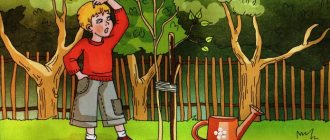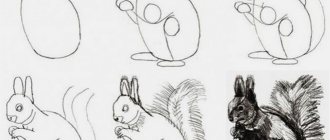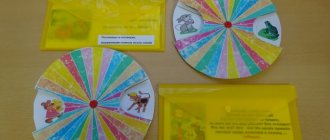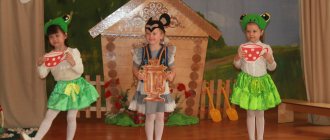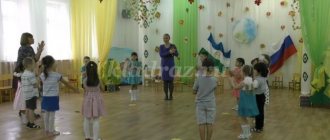General recommendations for conducting speech therapy classes on the topic “Professions” in a preschool educational institution
When conducting a speech therapy session “Professions”, it is important to take into account the characteristics of children’s perception. Children do not yet have self-discipline skills. Therefore, it is important that the activity is playful in nature and captivates them.
Developmental activities for classes
When conducting classes, not only games can be used that expand the children’s knowledge, but also exercises to learn how to correctly pronounce sounds in words and improve speech skills. It is recommended that you plan your children's learning in the coming weeks.
Games on the topic: “Professions”
In this case, riddles and questions are asked, the answers to which expand the children’s knowledge about various specialties. Sometimes false statements are made so that kids will find a mistake.
Stories relating to various specialties are compiled.
List of reading materials for the group
When lexical topics in speech therapy related to professions are considered, for example, reading the following works can be used to work with children:
- J. Rodari “What color are the crafts.”
- Y. Akim “Neumeika”.
- A. Shibarev “Mailbox”.
Note! Reading and discussing works of fiction will help children better understand the topic they are studying. It is useful if such readings are additionally carried out by their parents at home.
Thematic physical education minute
The following describes one example of physical education.
Kids perform movements while the teacher reads the poem “Postman”:
What the postman brought us (Clenches his fists)
He walks around with a thick bag
Translation, magazine, newspaper
There are two cassettes in the parcel (Kids straighten and bend their fingers)
And a letter from Aunt Valya
So that they await her arrival (Hands spread to the sides).
Gymnastic exercises
Typically, physical exercises and finger gymnastics are used during classes. At the same time, the teacher reads a poem related to the topic under consideration. At certain moments, children perform movements that relate to the spoken phrases. If necessary, the teacher tells you what to do.
Using interactive whiteboards and ICT in the learning process
The use of ICT makes it possible to offer children exciting educational computer games.
For example, they may be offered pictures of people and objects that they use in their work. At the same time, children will have to describe in words what is shown in the pictures and write a short story about this profession. The use of computer technology can expand the learning opportunities for preschool children. However, it is necessary to teach children to work with it in subgroup classes.
Age characteristics and correction of speech disorders during group classes
Knowledge of the peculiarities of the lives of adults related to their work is vital for children, but at different ages the approach to studying issues related to professions should be different. He must take into account the age characteristics of the children.
Poster about different professions
Lexical topic “Professions” in the middle group
Classes in the middle group not only develop speech skills, but also provide basic knowledge about what professions are and what they are like.
Purpose and objectives of the lesson: getting acquainted with different professional specialties
The following tasks are performed:
- When working with children, they are given the concept that there are different professions and are told about their main features.
- Vocabulary develops, articulation improves when pronouncing sounds.
- Children develop auditory attention and logical thinking.
It is recommended to plan classes for the near future.
Brief lesson plan
Finger gymnastics is performed with children. It is done as follows:
The use of mnemonics in the development of speech in preschool children
There are many noble professions (In this case, in turn, each finger of the right hand is connected to the thumb).
Both useful and pleasant (Make the same movements with the fingers of your left hand).
Cook, doctor, painter, teacher, salesman, miner, builder (Connect the fingers of the left hand and right hand with the thumbs).
I don’t name everyone at once (at the same time, the kids clench and unclench their fists several times).
I suggest you continue (children stretch their arms forward, keeping their palms facing up).
Next, the teacher conducts a poetic dialogue with the kids: “Was there a shoemaker?/Was!/Sewed boots?/Sewed!/Who are the boots for?/For the neighbor’s cat!” This exercise is designed to improve the clarity of diction and work on the expressiveness of the pronunciation of sentences.
The lesson uses tongue twisters to develop clarity of pronunciation and correct pronunciation of various sounds. At the same time, the teacher and the children try to pronounce certain phrases. Here is an example of a tongue twister: “The leaking faucet really wants the plumber to fix it.”
Important! Throughout the lesson, children are given a variety of vocabulary exercises.
Thematic poems and tongue twisters
The poetic form of presenting material to children helps them better assimilate the material. Therefore, it is important to use poems and read them aloud to the teacher together with the children. One of the exercise options is to ask poetic riddles.
Here are some examples:
- “Doctor, but not for children, but for birds and animals. He has a special gift. This doctor..." (Vet).
- “We teach children to read and write. Love nature, respect the elderly." (Teacher).
- “At work, day after day, he commands with his hand. That hand raises. A hundred pounds under the clouds." (Crane operator at a construction site).
Tongue twisters not only allow you to improve your vocabulary, but also provide an opportunity to improve children’s diction.
The following tongue twisters can be used:
- “Sailors in sailor suits. Sailor suits in stripes."
- “Two woodcutters, two woodcutters are chopping wood with axes in the yard.”
- “The weaver is weaving fabric for Tanya’s dress.”
When working with children in a speech therapy lesson on the topic “Professions,” the following game can be used. It's called "Fable Poems."
Its goals are: improving auditory attention, improving the ability to think logically, and developing children’s vocabulary related to the topic of professions.
The game consists of reading poems about the professions of adults to children, and in them the teacher makes erroneous statements. Kids are required to determine what is true and what is not. At the same time, the speech therapist and children discuss the answers in detail.
Lexical topic “Professions” in the senior group
Important! At this age, children are able to master not only basic concepts about various specialties, but also begin to create general ideas about the world of adults and the place that professional activity occupies in it.
Objectives of the lesson: forming a holistic picture of the world
Children are taught to briefly talk about their professions. During the lesson, they learn more about the types of activities adults do. When assignments are completed for children in the speech therapy group on the topic “Professions,” children are taught that work is necessary and its social significance is explained.
Kids are trained to form masculine and feminine words from the names of workers (military and military, teacher and teacher).
Note! Children develop the ability to recognize speech by ear, improve visual perception and attention. They are helped to develop memory, attention and the ability to speak coherently.
Children are encouraged to be active, take initiative, and have the ability to work collectively.
Lesson outline
When considering lexical topics in the senior group, a thematic physical education session first takes place.
A conversation is held about what a profession means for an adult. They talk about how there are different professions and give relevant examples. They talk about the need to earn money to buy household items that the family needs.
Peculiarities of mastering the sound aspect of speech by preschoolers
The story is told on behalf of the kids who were arguing about whose profession was more important. The teacher and children discuss this dispute and give their answers.
A rhyming game is being played. For example, phrases are uttered about professions related to transport: “The train is driven by ... (driver). Plowing the field... (Tractor driver)..." Children must complete each phrase.
Children take cards out of envelopes and see pictures of a person working. They should talk about his specialty.
Children, with the help of a teacher, compose their stories about various professions, guided by a rough plan and pictures.
A physical education session is held. At the same time, poems about professions are read, during which children imitate the corresponding movements.
The teacher gives phrases, and the children guess who could say them.
Kids are asked to name workers in masculine and feminine genders (for example, pilot).
In conclusion, the results are summed up, the teacher reminds the children what new they have learned.
Game technologies in education
In the process of working with children, lexical exercises are actively used and physical education sessions are held. Children are taught to independently compose simple stories about various specialties. Questions and riddles are actively used, to which children must find the answer.
Lexical topic “Professions” in the preparatory group
At this age, it is important to prepare people for school, to give them knowledge of how adults live.
Purpose and objectives of the lesson
In classes with preschoolers, it is necessary not only to expand the vocabulary related to the topic under consideration, but also to form their horizons, make knowledge more systematic, develop children’s communication skills, and the ability to coherently express their thoughts.
Activities
At this time, physical education and game moments are still important, but the formation of an outlook, the ability to express one’s thoughts and the ability to conduct a focused dialogue with other people are of particular importance.
Preliminary work on studying literary material
The teacher tells the children about descriptions of various workers that are available in children's literature.
The children read aloud thematic literary works.
Equipment
When the lexical topic “Professions” is considered in the preparatory group, pictures are needed as handouts. They should depict representatives of various professions.
Note! The teacher should have prepared demonstration images on the topic of the lesson. A board or screen can be used on which visual material will be shown.
Speech therapy lesson notes - Journey into the world of professions
Synopsis of a frontal speech therapy session on the correction of dysgraphia caused by general speech underdevelopment of level III for 2nd grade students of the KRO
Topic: Journey into the world of professions.
Goal: development of students’ oral speech based on the formation of knowledge about professions
Tasks:
Correctional and educational:
- Formation of knowledge about the professions “Artist”, “Composer”, “Musician”, “Singer”.
- Consolidating the skills of using nouns in speech R.p. units
- Strengthening the skills of agreeing nouns with adjectives in gender.
- Learning to write a story according to plan.
Corrective and developmental:
- Expand your vocabulary on the topic.
- Develop memory, thinking, general and fine motor skills.
- Develop phonemic awareness.
- Develop skills in language analysis and synthesis.
Correctional and educational:
- Cultivate interest in people's professional activities.
- Develop the ability to listen and hear the teacher.
- Cultivate a respectful attitude towards the responding comrade.
Equipment: laptop, sound recordings (the sound of wheels, sounds of musical instruments), whistles, subject pictures, cards for individual work
Progress of the lesson
I. Organizational moment.
- Hello guys. Say hello to our guests. — Let’s start our speech therapy session. Today we will continue to travel through the world of professions. But you will find out what we will travel on by guessing the riddle.
Iron huts are attached to each other. One of them with a trumpet leads everyone along.
(Train)
- Listen, our train is very close. (The audio recording “The sound of train wheels” sounds) - It’s time to take your tickets and take your seats. (the numbers 12,21, 35, 53, 17,71 are written on the tickets and on the chairs)
II. Main part.
1. Breathing exercises.
-Our train is leaving. It's time to blow the whistle. Repeat: TU TU - TU TU - TU - TU - Whist the whistle: quietly; loud.
2. Development of facial muscles.
- Now look out the window to the left. Close your eyes tightly. Open your eyes. Close your eyes again. Smile and wave to those seeing you off.
- Look to the right. Sing what you see outside the window.
- What letters and sounds are these? (vowels)
— Do the exercise “Delicious Jam”, “Horse”, “Turkey” with me
3. Khudozhestvennaya station
- Here is our first station. Let's go out. Who's meeting us? (artist) - How many of you know what an artist does? (he writes (draws) pictures) - The vowels are lost in the word “h__d__zhn__k”. Help them return to their places. — Let's take a walk around the Khudozhestvennaya station.
Assignment “What does an artist need?”
— Answer the question what does an artist need to create a painting. — Start like this: The artist needs….(brushes, paints, paper, pencils) (object pictures on the board)
Vocabulary work (familiarity with new words)
An easel is a stand, usually wooden, on which the artist places a painting or drawing while working. Canvas is the fabric on which the artist writes (draws).
Game "Fourth wheel"
-Name the pictures. Cover up the extra item. (brushes, paints, hammer, easel) (paints, pencils, brushes, canvas)
Quest “The Forgetful Artist”
— The artist was asked to draw a portrait, but he kept forgetting to finish drawing something. Help the artist, tell me what is missing in each picture. (no nose, no eyelashes, no eyes, no hair)
Quest "Unfinished Images"
- Guess what the artist wanted to draw. (candy, mitten, cucumber, egg, house, bow, bow, ring)
The task “Which one? Which? Which?"
- Choose any card and read the word - sign. What subject does it refer to? (chocolate, knitted, boiled, salty, wooden, elegant) - What items are left? Come up with words for them. — We return to the carriage and continue our journey. While we are driving to the next station, I suggest you complete the task on the card.
Individual card No. 1
O Find the hidden words and circle them.
BRUSH PENCIL ARTIST PAINTING -Find the extra word and prove why it is extra. (draws is a verb, the rest of the words are nouns)
4. Station "Musical"
— Our train has arrived at the new station. Who's meeting us? (Happy notes)
-Merry notes want to introduce you to the main people of the Muzykalnaya station. -We will find out who they are if we decipher the words. Write the letters using the alphabet. (work in pairs)
| 12 | 16 | 14 | 17 | 16 | 9 | 10 | 20 | 16 | 18 |
| TO | ABOUT | M | P | ABOUT | Z | AND | T | ABOUT | R |
| 14 | 21 | 9 | 29 | 12 | 1 | 15 | 20 |
| M | U | Z | Y | TO | A | N | T |
| 17 | 6 | 3 | 6 | 24 |
| P | E | IN | E | C |
— The composer writes (composes) music. To do this, he uses notes. (picture) - A musician performs music by playing musical instruments. - Singer. He performs music in songs. — Musicians and singers often perform at concerts. - Let's take a walk around the Muzykalnaya station and play a little.
Game "Guess what it sounded like?"
- Listen carefully and say what you think it sounded like. (children guess the sounds of musical instruments and find the corresponding picture) - Choose a general concept. (musical instruments)
Game “Say the Word”
(with a ball) Plays the guitar...(guitarist) Plays the piano...(pianist) Plays the button accordion...(accordion player) Plays the trumpet...(trumpeter) Plays the violin...(violinist) Plays the drum...(drummer)
“Let’s go back to the carriage and rest a little.”
5. Logorhythmic exercise “The train is coming”
The locomotive is moving, moving (shoulder movements, arms bent at the elbows) Two pipes and a hundred wheels. The locomotive shouts: “Doo-doo!” (hands up: one, then the other) “I’m walking, walking, walking” (walking) And the carriages are knocking, and the carriages are talking (shoulder movements, arms bent at the elbows) “So - so - so! So so so! So so so! So so so!" (claps hands)
6. Individual work on cards (card No. 2).
O Read the words backwards, starting with the last syllable. Write them down, divide them into syllables. RATAGI, BANRABA, BATROU
III. Summary of the lesson.
Assignment “Making a story about a profession”
- Guys, well, you and I have returned home. Look, they are greeting us. Let's talk about who we met on our trip today. — I suggest you fill out the table. (the speech therapist fills out the table together with the children)
| 1. Name of profession. | ARTIST |
| 2. What does a person in this profession do? | DRAWS (WRITES) PICTURES |
| 3. What is needed for work (tools and equipment). |
Work in pairs.
— Look on the table you have a table. Fill it out yourself. Work together with your desk mate.
| 1. Name of profession. | COMPOSER |
| 2. What does a person in this profession do? | WRITES (COMPOSES) MUSIC |
| 3. What is needed for work (tools and equipment). |
| 1. Name of profession. | MUSICIAN |
| 2. What does a person in this profession do? | PERFORM MUSIC BY PLAYING MUSICAL INSTRUMENTS |
| 3. What is needed for work (tools and equipment). |
| 1. Name of profession. | SINGER |
| 2. What does a person in this profession do? | PERFORMS MUSIC IN SONGS |
| 3. What is needed for work (tools and equipment). |
— Tell us about your profession using the table.
IV. Reflection.
— Assess your mood during class using emoticons. — Thank you everyone for your work. Get a prize.
References:
Baskakina I.V., Lynskaya M.I. Solochka. Speech therapy games. – M.: Iris – press, 2014. Lalaeva R.I., Speech therapy work in correctional classes. – M.: VLADOS, 2004.
The author of the material is a teacher-speech therapist at GBS(K)OU boarding school No. 136. Samara: Zotke Oksana Aleksandrovna
Also on topic:
Lesson notes for 2nd grade (level 3 OHP) on the topic “Spring”
